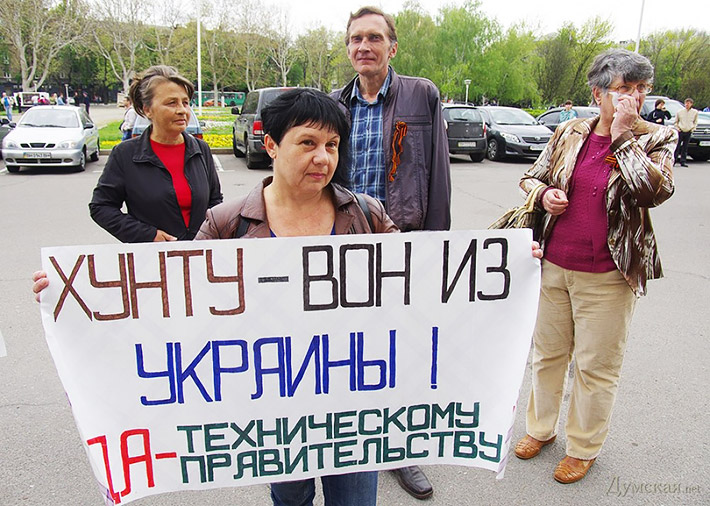by Maksym Vasin
 In eastern Ukraine there are rumors about a ‘junta’ in Kyiv; as there are about elusive Ukrainian nationalists and the ‘mighty’ Right Sector.
In eastern Ukraine there are rumors about a ‘junta’ in Kyiv; as there are about elusive Ukrainian nationalists and the ‘mighty’ Right Sector.
But for the sake of peace, the inhabitants of Donbas should thoroughly re-consider what the term ‘junta’ means; and what relationship the new Kyiv authority has to a ‘junta’.
According to the dictionary:
Junta – a military, reactionary, terrorist group in Spain and the countries of Latin America
In modern usage the word ‘junta’ is often used to refer to the dictatorship of a group of military leaders, which came to power as a consequence of an armed revolution.
Many illusionists would envy the skills of Russian propagandists, who have managed to associate this term with the new government in Kyiv. After all, the shift in power in Ukraine actually occurred as a result of the events chronologically outlined below.
The former Ukrainian President, Viktor Yanukovych, for three months after November 30, 2013, unsuccessfully tried to disperse several thousand peaceful protest on Independence Square in Kyiv – and in other regions of the country.
Almost all Ukrainian domestic security forces were brought to Kyiv for this purpose: police officers, Security Service (SBU) and Interior Ministry troops – including ‘Berkut’, ‘Tiger’, ‘Jaguar’, ‘Falcon’, ‘A’ (Alpha) Squad, etc.
From January 19, 2014 security services started using stun and gas grenades and pump-action shotguns – with both rubber and live ammunition – against protesters. As a result, the first protest participants to be killed, on 22 January, were Serhiy Nigoyan and Michael Zhyznevskyj; and in a wood near Kyiv activist Yuriy Verbitskiy was found dead, with signs of torture.
Such actions by the previous government led to an escalation in violence; there was a transition to resistance using Molotov cocktails and paving missiles, against armed officers representing state authorities.
The first hundred deaths of protestors – shot by automatic weapons and sniper rifles in the period from 18 to 20 of February – failed to allow the authorities to clear Maidan by force.
On the morning of February 21, in the presence of the President of Russia and EU representatives, Yanukovych signed an agreement with opposition leaders (Yatsenyuk, Klitschko, and Tyanibok) about holding early presidential elections – in December 2014.
The main term of the agreement was to adopt and to sign, within 48 hours, legislation which returned to the 2004 Constitution; thereby limiting presidential power, in favour of the Rada (Parliament).
On the same day, in the Rada of Ukraine, 386 deputies – more than the required 300 votes –adopted a law on returning to the 2004 Constitution. But that night Viktor Yanukovych suddenly flew out of Kyiv, failing to fulfill his part of the agreement.
On the morning of February 22 Yanukovych recorded a video message in Kharkov, subsequently leaving Ukraine with much of his wealth. On 27 February he re-appeared in Russia.
Due to Yanukovych’s flight, on the evening of the 22 February the Parliament of Ukraine adopted Resolution #4193 – ‘On Self-Elimination of the Ukrainian President from the Fulfilling of Constitutional Powers’. The document called for the holding of presidential elections in May 25, 2014; 328 Ukrainian deputies voted for this decision.
Thereafter, on February 22, Alexander Turchynov was appointed new Speaker of Parliament and Acting President of Ukraine; 285 out of 339 deputies present in the Rada voted in favour of this. And on 27 February, the Rada of Ukraine appointed Arseniy Yatsenyuk as Prime Minister. 371 deputies voted for this, representing 82% of the total number of Rada deputies.
Let's examine exactly who brought to power the new leadership of the Ukrainian government.
Voting results show that the largest bloc voting for the new Prime Minister was the faction of the Party of Regions, whose honorary President at that time was ex-President Yanukovych; 94 deputies from the P. of R. voted for the changes.
And 31 more votes in support of the new heads of the Ukrainian government came from the ‘Economic Development’ faction, recently created by Party of Regions members.
Batkivshchyna gave 85 votes; independent deputies 51; Klitschko’s UDAR Party 40; Svoboda 36; and 34 came from the newly-formed ‘Sovereign European Ukraine’ group.
Of parliamentarians who voted in support of the new head of the Cabinet of Ministers of Ukraine, one third had been elected by the people of Donbas and south-eastern regions of Ukraine.
It is obvious that the Parliament of Ukraine, with its 450 deputies, is the best representative of the interests of all citizens; regardless of different party preferences and areas of residence. And this legally elected parliament – on the grounds of constitutional changes supported by an absolute majority – adopted decisions about the change of power in Ukraine.
Slogans about a ‘Kyiv junta’ are nothing more than just another somersault by the Russian authorities and the propagandist media controlled by them. They are globally isolated in calling decisions by the Ukrainian Parliament conflict and upheaval; and the terrorists armed with automatic weapons and mortars in Donbas peaceful protestors.
The principle of ‘divide and rule’ has been adopted by the separatists, who are not interested in a united and prosperous Ukraine; nor interested in the well-being of its eastern regions.
Author: Maksym Vasin, Lawyer (Kyiv/Donetsk)
Source: http://mvasin.org.ua/2014/05/631
Translated by Victor Vityuk, edited by Jon Barrow


